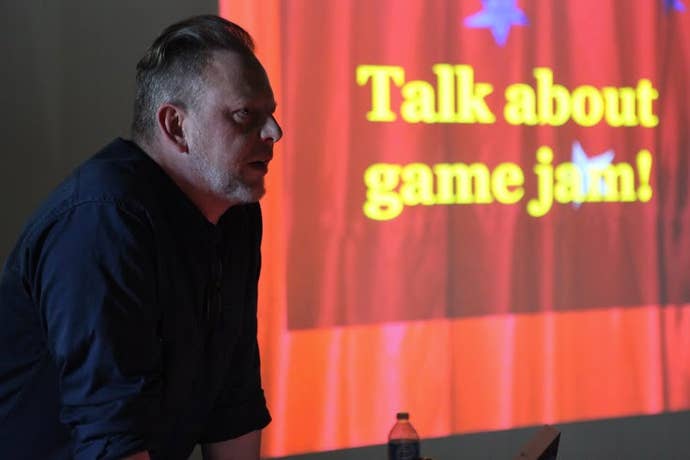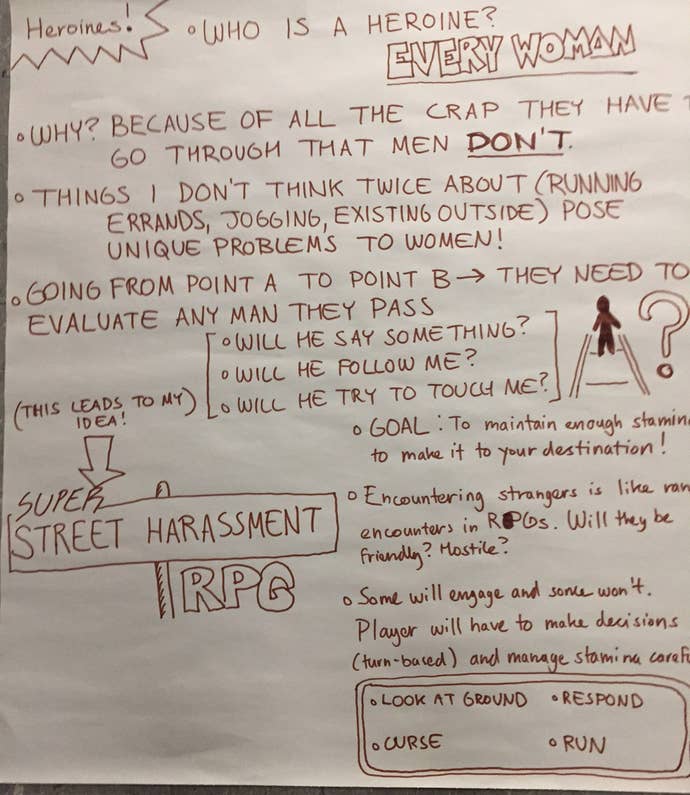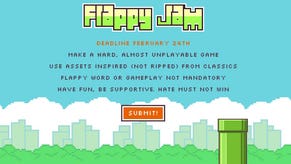Welcome to the Jam: The Making of Super Street Harassment RPG
Critic becomes creator as USgamer's Bob Mackey puts his skills to the test throughout a grueling, game-making weekend.
This article first appeared on USgamer, a partner publication of VG247. Some content, such as this article, has been migrated to VG247 for posterity after USgamer's closure - but it has not been edited or further vetted by the VG247 team.
Day One: Getting to Know You
Like many non-metropolitan colleges of its ilk, California State University's East Bay location was likely chosen not for the sake of convenience, but for how photogenic it would look within the pages of full-color brochures. Just a 20 minute bus ride from the nearest train station, and nestled within the undeveloped hills of Hayward—a city whose downtown feels like 1947 never ended—CSU's East Bay campus offers the same grassy sprawl as any Midwestern place of higher learning. Built in an era of massive academic expansion, when the G.I. Bill sent waves of returning veterans back to school, the campus' architecture definitely reflects its history. The Arts and Education building, with its wood paneling and rainbow wall motifs, feels ripped right from a much different time for the Bay Area, when student protests made up the "local color," so to speak.

The Game Jam officially kicked off with a speech by Erin Hoffman of GlassLab Games, a Redwood City edutainment developer. In this brief presentation, Hoffman defined games as "machines that create emotion," and encouraged us to have our games center around three basic actions—forming a loop—that would evoke the kind of reactions we want. Then, she revealed the theme these projects-to-be would focus on: heroines. Now, it's not that feminism has ever been a non-relevant issue, but in recent years, we've seen a groundswell of activity directed towards improving the portrayal of women in video games—as well backlash from groups like GamerGate who seek to preserve a harmful status quo. Our games were to use the idea of the "heroine" as a foundation, with the added requirement of having a female protagonist as an essential part of its design. After handing each of us a large, poster-board-sized sheet of paper, the coordinators released us to work independently, where we'd have 30 minutes to develop a 60 minute pitch, which had the possibility of becoming a moderately realized game by the weekend's end.
Being somewhat underequipped with my major lack of programming and minor lack of art talent, I fell back on my presentation skills as a former college writing teacher to craft a pitch around an issue that's inescapable for many of the women in my life: street harassment. It's a problem I hadn't really been aware of until I moved close to a major city in 2011, and definitely something a great deal of men take for granted. Perverts are no longer relegated to the cartoonish trenchcoat-clad types from popular media, and sadly, not all street harassers are necessarily perverts.

Appraising women's appearance publicly has been normalized to the point of ubiquity in many cities, making every male passerby a potential danger for women—regardless if said woman is wearing baggy sweats or skin-tight yoga pants. Keeping this in mind, I developed a basic idea for "Super Street Harassment RPG," (along with an eye-catching logo) where players would take the role of a woman trying to get from point A to point B on a very average day. Each encounter with another person—friendly or hostile—would play out via the mechanics of an old-school, turn-based RPG battle system. With any luck, this experience would teach the player about this insidious issue without making light of the struggle—admittedly, a tricky line to walk when games are ostensibly meant to entertain. Still, the simple mechanics of a classic RPG seemed like an easy enough set of rules to replicate over the course of a weekend, so I stuck to my guns.
Through luck of the draw, I ended up pitching my idea at the tail-end of a long procession—good for me, since this meant everyone else would be seated, rather than in line and tuning out any stimulus for the sake of psyching themselves up. My initial confidence nearly faded, though, when my initial explanation failed to evoke any reaction. Other pitches saw their share of laughs, whispers, and other natural responses, but mine met nothing but silence. To be fair, Super Street Harassment RPG went for a much more specific angle than "motherhood" or "equality," and I wasn't sure if I hit a little too close to home for some of the audience—and I'm sure more than a few out there were wondering if it'd be socially acceptable to respond at all.
With upwards of thirty pitches to speak of, it was time to cull the herd. Each of us affixed our respective pieces of paper to the wall, and then stuck a yellow Post-It on the three games we most wanted to work on. Every few minutes, we removed one, until only the projects we wanted to happen most bore our self-sticking mark of approval. With a tiny bit of shame, I ended up choosing my own: Because I had a good decade on most of the attendees, and nearly ten years of writing about games behind me, I had a bit of an advantage in that my pitch was one of few that didn't just try to sell an idea, but the mechanics behind the idea. But well before I could reveal my secret identity as a journalist, as least one of the attendees picked up on a few clues. When I returned to the auditorium to grab my overstuffed bag, he approached and said, "You've done this before, haven't you?"
Busted.




